|
|
|
Sort Order |
|
|
|
Items / Page
|
|
|
|
|
|
|
| Srl | Item |
| 1 |
ID:
133281
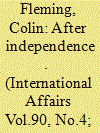

|
|
|
|
|
| Publication |
2014.
|
| Summary/Abstract |
The Scottish government's white paper on independence, Scotland's future, sets out its defence blueprint following a 'yes' vote. It makes clear that its defence plans would be subject to a Strategic Defence and Security Review in 2016, as well as negotiation on the division of assets with London. However, it also provides a strong indication of how it envisages its defence posture as an independent state-a major pillar of which is founded upon strong and continued defence cooperation with the rest of the United Kingdom. Is this a realistic assumption? And, if so, how would it work in practice? Contextualized by the increased emphasis on defence cooperation which sits at the heart of NATO's Smart Defence initiative, as well as the European Defence Agency's 'pooling and sharing' programme, the article assesses the benefits and challenges that might be encountered in a defence cooperation agreement between an independent Scotland and the rest of the United Kingdom in the event of a 'yes' vote in September's referendum.
|
|
|
|
|
|
|
|
|
|
|
|
|
|
|
|
| 2 |
ID:
133289
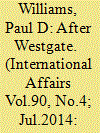

|
|
|
|
|
| Publication |
2014.
|
| Summary/Abstract |
The attack on the Westgate Mall in Nairobi, Kenya, in September 2013 intensified international scrutiny of the war against Harakat Al-Shabaab Mujahideen (Movement of the Warrior Youth). This article analyses the current state of affairs with reference to the three principal sets of actors in this war: Al-Shabaab, the African Union Mission in Somalia (AMISOM) and its international partners, and the various actors currently involved in building the Somali Federal Government's security forces. It argues that although the newly reconfigured Al-Shabaab poses a major tactical threat in Somalia and across the wider Horn of Africa, the movement is becoming a less important actor in Somalia's national politics. As Al-Shabaab loses territory and its popularity among Somalis continues to dwindle, other clan- and region-based actors will become more salient as national debates over federalism, the decentralization of governance mechanisms beyond Mogadishu and the place of clannism will occupy centre stage. As a consequence, AMISOM's principal roles should gradually shift from degrading Al-Shabaab towards a broader stabilization agenda: encouraging a national consensus over how to build effective governance structures; developing an effective set of Somali National Security Forces; and ensuring that the Federal Government delivers services and effective governance to its citizens, especially beyond Mogadishu in the settlements recently captured from Al-Shabaab. As it stands, however, AMISOM is not prepared to carry out these activities. More worryingly, nor is the Somali Federal Government.
|
|
|
|
|
|
|
|
|
|
|
|
|
|
|
|
| 3 |
ID:
133292
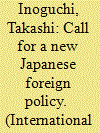

|
|
|
|
|
| Publication |
2014.
|
| Summary/Abstract |
Japanese foreign policy is at a crossroads. A global power transition is under way; while the United States remains the leading global power, across the globe non-western developing states are on the rise. Within Asia, China is a growing presence, wielding expansive claims on islands and maritime rights, and embarking on a defence buildup. As power shifts across Asia and the wider world, the terms of leadership and global governance have become more uncertain. Japan now finds itself asking basic questions about its own identity and strategic goals as a Great Power. Within this changing context, there are three foreign policy approaches available to Japan: (1) a classical realist line of working closely with the US in meeting China's rise and optimizing deep US engagement with China by pursuing a diplomacy focused on counterbalancing and hedging; (2) a transformative pragmatist line of rejuvenating itself through Abenomics and repositioning itself in East Asia; and (3) a liberal international line of pursuing a common agenda of enhancing global liberal-oriented norms and rules through multilateral institutions along with the United States and the Asia-Pacific countries. Current Japanese foreign policy contains a mix of all three approaches. The article argues that a greater focus on the second and the third lines would enhance the current approach; it would ensure that Japan is more in harmony with the global environment and help it work positively for global and regional stability and prosperity, thus enabling Japan to pursue an 'honorable place in the world' (as stated in the preamble to its constitution).
|
|
|
|
|
|
|
|
|
|
|
|
|
|
|
|
| 4 |
ID:
133285
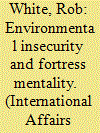

|
|
|
|
|
| Publication |
2014.
|
| Summary/Abstract |
This article explores the political, economic and ecological context within which environmental insecurity emerges and feeds back into a fortress mentality. Shortages of food, water and energy sources are the trigger for nefarious activities involving organized criminal networks, transnational corporations and governments at varying political levels. The consequences of such activities contribute to even more ruthless exploitation of rapidly vanishing natural resources, as well as the further diminishment of air, soil and water quality. These developments, in turn, exacerbate the competitive scramble by individuals, groups and nations for what is left. The accompanying insecurities and vulnerabilities ensure elite and popular support for self-interested 'security'. Accordingly, the 'fortress' is being constructed and reconstructed at individual, local, national and regional levels-as both an attitude of mind and a material reality. Fundamentally, the basis for this fortress mentality is linked to decades of neo-liberal policy and practice that have embedded an individualizing and competitive self-interest that, collectively, is overriding prudent and precautionary policy construction around climate change and environmental degradation. The net result is that security is being built on a platform of state, corporate and organized group wrongdoing and injustice, in many instances with the implied and/or overt consent of relevant publics. Yet, as long as the fortification continues apace, it will contribute to and further exacerbate varying levels of insecurity for all.
|
|
|
|
|
|
|
|
|
|
|
|
|
|
|
|
| 5 |
ID:
133286
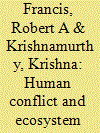

|
|
|
|
|
| Publication |
2014.
|
| Summary/Abstract |
Environmental degradation resulting from warfare is a growing concern, particularly with increasing recognition of humanity's dependence on healthy ecosystems. Though environmental legislation does exist that seeks to prevent or mitigate environmental harm before, during and after conflict, it has limited scope and effectiveness. This may be one reason why the environmental laws of war are so rarely applied in attempts to bring parties responsible for environmental harm to justice. Enforcement of such legal instruments also requires appropriate quantification of environmental damage, which is particularly difficult in a warfare context. A focus on the loss of environmental resources, habitats or ecosystems is only part of the story-the real cost of environmental damage is in the loss of ecosystem services that such resources provide, both now and in the future, and which regional and global human societies depend upon. The ecosystem services framework, wherein the costs of damage to ecosystem services are quantified in economic terms, may prove a more effective way of highlighting the environmental damage resulting from warfare. Moreover, quantification along monetary lines is potentially more likely to establish a solid case for justifiable reparations than criteria relating to loss of biodiversity or ecosystem health, which are more difficult for society and governmental agencies to place specific values on. This article discusses the ecosystem services framework in the context of warfare, and highlights both the potential and the challenges that may accompany adoption of such a framework by the international community.
|
|
|
|
|
|
|
|
|
|
|
|
|
|
|
|
| 6 |
ID:
133291
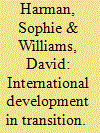

|
|
|
|
|
| Publication |
2014.
|
| Summary/Abstract |
International development is in a period of transition. While the outcome of this is still unclear, this article argues that there are at least four areas in which the project of international development is changing. First, there is a debate, especially within the World Bank, about development strategy and how we think about development, particularly in terms of the balance between states and markets. This is evident in the debate over state failure and the new structural economics. Second, there is increasing evidence of a shift in lending, away from projects of 'small' human development, perhaps best encapsulated by the United Nations Millennium Development Goals, towards more transformative 'big' development projects such as infrastructure. Third, 'non-traditional' aid donors and new forms of private philanthropy are playing a more significant role in development financing and this, in turn, offers developing countries a new range of choices about what kinds of development assistance they receive. Fourth, aid relations are changing as a result of the renewed agency of developing states, particularly in sub-Saharan Africa, and shifts towards increased South-South cooperation are growing as evidenced by increased funding from regional development banks and increased trade flows. The article reviews these changes and suggests a series of questions and challenges that arise from them for analysts of international development, developing countries and traditional aid donors.
|
|
|
|
|
|
|
|
|
|
|
|
|
|
|
|
| 7 |
ID:
133280
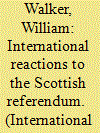

|
|
|
|
|
| Publication |
2014.
|
| Summary/Abstract |
The referendum on whether Scotland should become an independent country will be held on 18 September 2014. This article reflects on the evolution of foreign governments' attitudes towards the referendum since its confirmation in October 2012, and on their expectations should a 'yes' vote result. With few exceptions, they have adopted a policy of non-intervention, treating the referendum as the UK's domestic affair. President Obama's expression on 5 June 2014 of his desire for the UK to remain 'a strong, robust, united and effective partner' may, however, be seen as a sign of increasing apprehension abroad. Concerns of foreign governments aroused by the referendum include the diminution of the UK's power and role in international affairs, the possible encouragement of other secessionist movements, and disturbance to international organizations and alliances. It is commonly assumed that Scotland would become a reasonably prosperous and reliable small state. But how would the rest of the UK (rUK), a much more powerful and populous country, respond to 'the loss of Scotland'? How would it affect the UK's already unsettled relations with the EU, including the prospect of a referendum on EU membership? Despite many uncertainties and a febrile political atmosphere, it is widely expected abroad that Scotland and rUK would settle into a cooperative relationship after a difficult transitional period, and that an independent Scotland would be accepted into the EU and NATO if it displayed flexibility on important issues.
|
|
|
|
|
|
|
|
|
|
|
|
|
|
|
|
| 8 |
ID:
133282
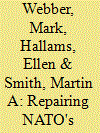

|
|
|
|
|
| Publication |
2014.
|
| Summary/Abstract |
NATO moves toward its next summit (to be held in Newport, Wales in September 2014) in a mood of anxiety and uncertainty. This is not simply because telling questions are being asked of the alliance in relation to Afghanistan and Ukraine, but because the twin motors which have sustained NATO now show signs of considerable wear and tear. The first of these motors relates to principles of purpose. This encompasses the activities (or purposes) which NATO has consciously pursued in the last 25 years: namely, operations, enlargement, partnership, transatlanticism and security. The second is principles of function: the means, in other words, by which NATO is kept in motion. Here, American leadership, cohesion and trust, burden-sharing and credibility all matter. These motors are not about to completely break down (NATO has underlying strengths which make that unlikely) but they do need attention. NATO's good health requires it to focus on a series of core tasks-what this article refers to as readiness, reassurance and renewal. These three tasks speak to an agenda of consolidation and preservation, rather than one of task expansion. But this is not a conservative agenda; grasping the nettle of prioritization and focus requires, in itself, a certain foresight and enterprise. Managed successfully, it is an agenda that will preserve and strengthen NATO in what are increasingly troubled times.
|
|
|
|
|
|
|
|
|
|
|
|
|
|
|
|
| 9 |
ID:
133283


|
|
|
|
|
| Publication |
2014.
|
| Summary/Abstract |
The rhino-poaching crisis in South Africa raises questions about whether it should be tackled through judicial processes or by the application of hard-power methods. The poaching of wildlife has traditionally been met with a harsh response to send a clear message of punitive deterrence. While the reaction of the South African authorities has been no different, the contemporary threat posed by poaching intersects with, and is complicated by, wider concerns such as border security and immigration. In many respects, this has led to what can be termed the 'rhinofication' of South African security. South Africa has a long political tradition that relies on force rather than dialogue, negotiation and reform. Yet, the hard-power response to protect the rhino and other large fauna, though necessary at one level, often runs up against the economic frustrations and temptations of a large, predominantly black, under-class, which for generations has been excluded from wildlife management and conservation by white 'exceptionalism'. Poachers are thus transformed through their counter-cultural actions into what Eric Hobsbawm termed 'social bandits'. While this social chasm lies at the heart of the 'rhino wars', it is clear that in practical terms the lack of a political/poaching settlement in the form of a racially inclusive conservation strategy almost certainly guarantees their continuation.
|
|
|
|
|
|
|
|
|
|
|
|
|
|
|
|
| 10 |
ID:
133287
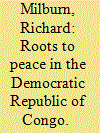

|
|
|
|
|
| Publication |
2014.
|
| Summary/Abstract |
The Democratic Republic of Congo (DRC) is endowed with an abundance of natural resources, and the presence of high-value resources such as coltan and diamonds is well known. The country is also endowed with a wealth of biodiversity, although the value of this is often overlooked. This article describes the detrimental impact of armed conflict on this biodiversity and the dangers posed by the return of peace, which is likely to result in increased biodiversity exploitation. The resulting loss of key carbon sinks crucial to the global fight against climate change will affect not only the DRC, but also the international community. Biodiversity is therefore identified as a threat to security but also a valuable asset for development, and this article discusses methods to realize the value of biodiversity in the DRC through the benefits of ecosystem services and income generated from monetizing biodiversity. It concludes by arguing that the false dichotomy of conservation and development as separate entities and objectives needs to change so that conservation becomes a central pillar of security and development work in the DRC and other regions of current or recent armed conflict around the world.
|
|
|
|
|
|
|
|
|
|
|
|
|
|
|
|
| 11 |
ID:
133288
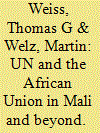

|
|
|
|
|
| Publication |
2014.
|
| Summary/Abstract |
The United Nations (UN) and the African Union (AU) have collaborated in building a viable African Peace and Security Architecture and have worked together in a number of armed conflicts over the past decade. Examples include the peace operations in Burundi and Somalia, and the hybrid peace operation in Sudan's Darfur region which is perhaps the most prominent illustration of this collaboration. Although the UN Security Council authorized the intervention in Libya, which was approved by leading regional organizations (the Arab League, the Organization of the Islamic Conference and the Gulf Cooperation Council), it was opposed initially by the AU although the three African states in the Security Council voted for it. Relations cooled as a result and have grown colder still as the UN snubbed the AU and its initial efforts to engage in post-conflict stabilization in Mali. While the AU sought to prove itself as a capable security provider and partner on the continent with its operation AFISMA, France's Opération Serval and the UN's peace operation for Mali, MINUSMA, bypassed the African Union. This article explores the underlying fault-lines between the two organizations by examining interactions between the UN and AU since the latter's launch in 2002, but focusing on the Mali case. The fault-lines emerging from the analysis are different capabilities, risk-averse vs risk-assuming approaches to casualties, diverging geopolitics and leadership rivalry.
|
|
|
|
|
|
|
|
|
|
|
|
|
|
|
|
| 12 |
ID:
133284
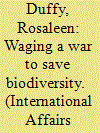

|
|
|
|
|
| Publication |
2014.
|
| Summary/Abstract |
This article examines the rise in militarized approaches towards conservation, as part of a new 'war for biodiversity'. This is a defining moment in the international politics of conservation and needs further examination. The claims that rhinos and elephants are under threat from highly organized criminal gangs of poachers shapes and determines conservation practice on the ground. Indeed, a central focus of the 2014 London Declaration on the Illegal Wildlife Trade is the strengthening of law enforcement, and recent policy statements by the US government and the Clinton Global Initiative also draw the link between poaching, global security and the need for greater levels of enforcement. Such statements and initiatives contribute substantially to the growing sense of a war for biodiversity. This article offers a critique of that argument, essentially by asking how we define poachers, and if militarized approaches mean conservationists are becoming more willing to engage in coercive, repressive policies that are ultimately counterproductive. Further, this article examines how the new war for biodiversity is justified and promoted by referring to wider debates about intervention in a post-Cold War era; notably that the international community has a responsibility towards wildlife, especially endangered species, and that military forms of intervention may be required to save them.
|
|
|
|
|
|
|
|
|
|
|
|
|
|
|
|
|
|
|
|
|